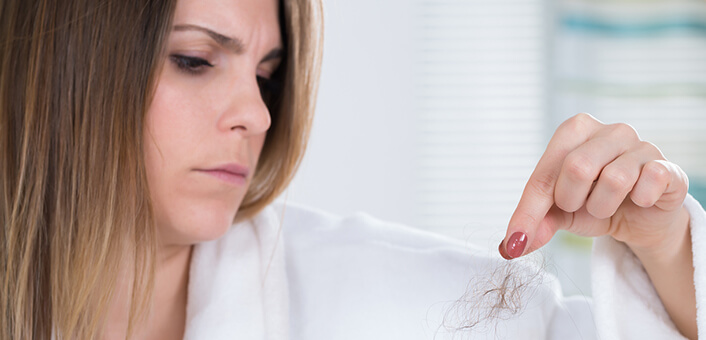One of the most common endocrine disorders, affecting women in India is the Polycystic Ovarian Syndrome (PCOS). A study reported that 10% of women of child bearing age are affected with PCOS in recent years. Women with PCOS have various symptoms which may be cosmetic, such as acne, facial hair and pigmentation, gynecological such as irregular periods, infertility and recurrent pregnancy loss, or endocrinological, such as obesity, insulin resistance and diabetes.
Among the many mentioned symptoms of PCOS, Hair Loss or ALOPECIA is one foremost problem, which the women face. Research has shown that 67% of all women who suffer from alopecia or hair loss also have Polycystic Ovarian Syndrome. Hormonal imbalance is one of the major symptoms, which women suffering from PCOS have to deal with. Many women have heightened levels of androgens or testosterone and dihydrotestosterone (DHT). High levels of these hormones in women with PCOS cause hair loss, specifically DHT. In excess, androgens, specifically DHT latch onto hair follicles and begin to affect the hair, eventually to the point of hair loss. DHT also causes the follicle to stop producing new hair; essentially a DHT clogged follicle is the result. This is called androgenic alopecia.
Given below are the points that can be very effective in combating Alopecia caused by PCOS.
Following proper PCOS diet and Exercise: (Best way to get rid of PCOS using herbal remedies) (Lifestyle modifications as a natural treatment for PCOS) Eating lots of green vegetables, healthy fats and balancing carbohydrates and proteins are the backbones of PCOS nutrition. Also one needs to keep a check on the weight gain as it has been observed that weight control improves many aspects of PCOS. A weight reduction of even a few percent has clinical benefits. All women with PCOS should be encouraged to follow a healthy diet and to engage in regular exercise.
Stress Management: Keeping stress levels to the minimum is highly recommended for women with PCOS. Chronic levels of cortisol, the stress hormone are just not what someone with PCOS symptoms needs. Following a healthy diet and exercise plan can work wonders. Meditation and yoga is very helpful to beat stress.
Sleep well: Sleep is regulated by two hormones, melatonin and serotonin. When they are disrupted by lack of sleep, this affects other hormones and makes them go haywire. Eating regularly will keep your insulin levels balanced and keep your hormones from being affected by drops and highs.
Hair Care: A well-crafted hair care regimen is highly recommended in PCOS. Avoid hair color, bleach and hair styling products. Also constant pulling hair back up and hairstyles that aggravate the scalp should be avoided. While washing hair, it should be made sure that the scalp is completely cleansed up to remove DHT residue.
Natural Supplements: One should ensure the intake of vitamin B, magnesium, zinc and biotin. Also regular intake of dietary supplement like FUROCYST can give positive results in PCOS management. Furocyst is an innovative product (extracted and developed through a novel & innovative U.S. patented process) involving separations of active ingredients from the natural plant without affecting chemical properties of the active fractions. No chemicals are used. It is a natural and promising dietary supplement effective for management of Polycystic Ovary Syndrome (PCOS). It has been clinically evaluated for efficacy and safety and has been shown to be completely safe for consumption with a 94% success rate.
Get Thyroid Checked: Many women with PCOS have hypothyroid (low thyroid) issues and the side effects include thinning hair and hair loss.
The statement and product have not been evaluated by the FDA to diagnose, treat, cure or prevent any disease.



